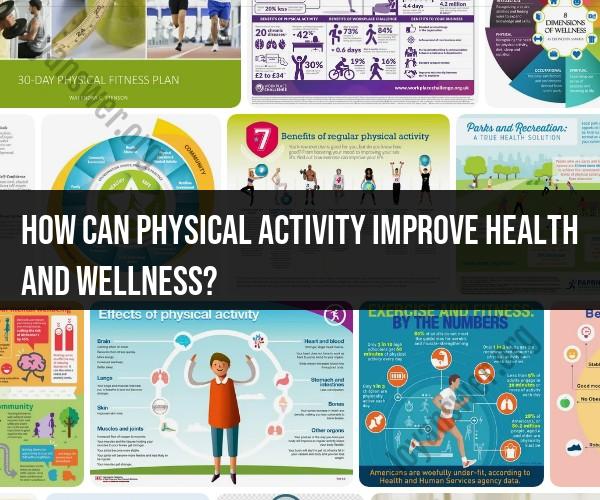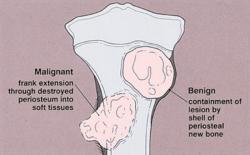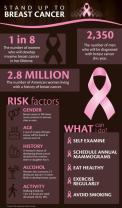How can physical activity improve health and wellness?
Physical activity plays a crucial role in improving health and wellness in various ways. Incorporating regular exercise into your lifestyle can have a positive impact on both your physical and mental well-being. Here are some of the key ways in which physical activity can improve health and wellness:
Cardiovascular Health: Regular physical activity, such as aerobic exercises (e.g., walking, jogging, cycling), can help strengthen the heart and improve cardiovascular health. It can lower the risk of heart diseases, reduce blood pressure, and improve blood circulation.
Weight Management: Engaging in physical activity helps burn calories and can assist in weight management. It can help prevent obesity and maintain a healthy body weight.
Muscle Strength and Endurance: Strength training exercises (e.g., lifting weights, bodyweight exercises) can increase muscle mass, strength, and endurance. Strong muscles support better posture and overall physical function.
Bone Health: Weight-bearing activities like walking, running, and resistance training can enhance bone density, reducing the risk of osteoporosis and fractures, especially in older adults.
Improved Flexibility and Balance: Activities like yoga and stretching exercises can enhance flexibility and balance, reducing the risk of falls and injuries.
Mental Health Benefits: Physical activity is linked to improved mood and reduced symptoms of anxiety and depression. Exercise stimulates the release of endorphins, which are natural mood lifters.
Stress Reduction: Engaging in physical activity can help reduce stress levels. It provides an outlet for stress and can improve your ability to manage stressors in daily life.
Enhanced Sleep: Regular exercise can lead to better sleep quality. It helps regulate sleep patterns and may alleviate symptoms of insomnia.
Boosted Immunity: Moderate exercise can strengthen the immune system, making your body more resilient to infections and illnesses.
Increased Energy Levels: Regular physical activity can boost energy levels and combat feelings of fatigue, making you more alert and productive.
Cognitive Benefits: Exercise has been shown to improve cognitive function and may reduce the risk of cognitive decline as you age. It can enhance memory, attention, and problem-solving skills.
Social Interaction: Participating in group fitness classes or team sports can provide opportunities for social interaction and help combat feelings of loneliness and isolation.
Longevity: Leading an active lifestyle is associated with a longer lifespan and an improved quality of life as you age.
To reap the benefits of physical activity, it's essential to find activities you enjoy and can sustain over the long term. The American Heart Association recommends at least 150 minutes of moderate-intensity aerobic exercise or 75 minutes of vigorous-intensity aerobic exercise per week for adults, along with muscle-strengthening activities on two or more days a week. However, even small amounts of physical activity can provide health benefits, so it's essential to start at your own pace and gradually increase your activity level. Always consult with a healthcare professional before beginning a new exercise program, especially if you have underlying health conditions.
The Transformative Power of Physical Activity on Health and Wellness
Physical activity is one of the most important things you can do for your health and well-being. It has been shown to have a wide range of benefits, including:
- Reducing the risk of chronic diseases such as heart disease, stroke, type 2 diabetes, and some types of cancer
- Improving mental health and mood
- Boosting energy levels and reducing fatigue
- Promoting healthy weight management
- Strengthening bones and muscles
- Improving sleep quality
- Reducing the risk of falls and injuries
Physical activity can also help you live longer. A study published in the journal JAMA Internal Medicine found that adults who engaged in regular physical activity were 33% less likely to die from all causes during the study period than those who were inactive.
Elevating Your Health and Wellness: The Impact of Physical Activity
Physical activity has a positive impact on all aspects of your health and well-being. Here are some specific examples:
- Physical activity improves cardiovascular health. Regular physical activity strengthens the heart muscle and improves circulation. This can help reduce the risk of heart disease, stroke, and other cardiovascular problems.
- Physical activity reduces the risk of chronic diseases. Physical activity helps to control blood sugar levels, blood pressure, and cholesterol levels. This can help reduce the risk of developing chronic diseases such as type 2 diabetes, heart disease, and stroke.
- Physical activity improves mental health and mood. Physical activity releases endorphins, which have mood-boosting effects. Regular physical activity can also help to reduce stress, anxiety, and depression.
- Physical activity boosts energy levels and reduces fatigue. Physical activity helps to improve cardiovascular fitness and muscle strength. This can lead to increased energy levels and reduced fatigue.
- Physical activity promotes healthy weight management. Physical activity helps to burn calories and build muscle. This can help you to lose weight or maintain a healthy weight.
- Physical activity strengthens bones and muscles. Physical activity helps to build and maintain bone density. It also helps to strengthen muscles and improve balance. This can help to reduce the risk of falls and injuries.
- Physical activity improves sleep quality. Regular physical activity can help you to fall asleep more easily and sleep more soundly.
- Physical activity reduces the risk of cognitive decline. Physical activity helps to improve blood flow to the brain and stimulate the growth of new brain cells. This can help to protect against cognitive decline and dementia.
From Couch to Fitness: How Physical Activity Boosts Your Well-Being
If you're new to physical activity, it's important to start slowly and gradually increase the intensity and duration of your workouts over time. It's also important to choose activities that you enjoy so that you're more likely to stick with them.
Here are some tips for getting started with physical activity:
- Aim for at least 30 minutes of moderate-intensity physical activity most days of the week.
- Break up your activity into shorter sessions if that's easier for you.
- Choose activities that you enjoy and that fit into your lifestyle.
- Start slowly and gradually increase the intensity and duration of your workouts over time.
- Listen to your body and take breaks when you need them.
If you have any health concerns, be sure to talk to your doctor before starting a new physical activity program.
Even a small amount of physical activity can make a big difference in your health and well-being. So get moving and start enjoying the many benefits that physical activity has to offer!













